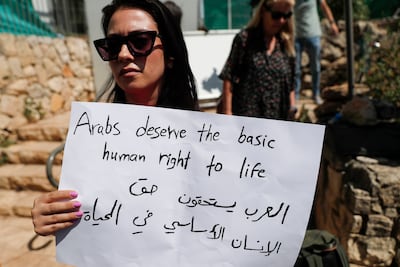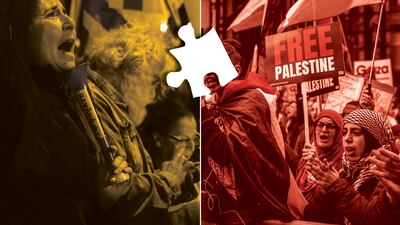What does it mean to be a Palestinian citizen of Israel since October 7? For me, as a Palestinian-Israeli professor working in the heated environment of academia in the US, it has meant many people – Americans, Palestinians, non-Palestinians, Jewish people and Israelis – feeling suddenly entitled to question aspects of my identity. My Palestinian identity and heritage, as well as my dedication to advocating for justice and equality for Palestinians, have been scrutinised and questioned.
I have even been labelled a disgrace, both in person and online, because I dared to challenge the effectiveness and morality of Hamas's methods. How could I not? I have watched numerous videos and recordings of the events that transpired on October 7. When, in a recent discussion in class on the topic of violence versus non-violence, I pushed back on the effectiveness of violence, a student shouted at me, insisting that I should not identify as Palestinian. This occurred even after I outlined the ramifications of the occupation and the historical injustices Palestinians have endured for decades.
At the same time, my Israeli citizenship and my commitment to nonviolent resistance have been questioned by many pro-Israel activists because I continue to criticise Israel's actions and policies in Gaza and the West Bank, as well as the crimes it is perpetrating in Gaza, and advocate for Palestinian rights to equality and justice. Any support for a ceasefire is labelled by these critics as support for Hamas and thus support for terrorism.
Palestinian citizens of Israel like me have long had to navigate multiple positionalities and identities, as well as violence. That reality was underscored on October 7.
Some of us experienced that day with a tremendous amount of anguish and sadness because we knew someone Jewish or Arab who was killed or taken hostage. Some of us saw the impact on members of the Negev Bedouin Arab community, who were quickly forgotten and marginalised. One of the videos recorded that day was of Fatma Abu Arrar, a mother of nine children under the age of nine, who was shot to death by Hamas fighters on motorcycles while she was driving her husband, Hamid, to work. Hamid managed to rescue their eight-month-old baby and hide with him for five hours in a secluded communication box, behind which more Hamas fighters waited to ambush Israeli soldiers. In a split-second decision, he removed his shirt and ran towards the Israeli troops, drawing fire towards himself. He survived, managing to save his son and warn the soldiers. This story is not an outlier; we saw how four Bedouin men from the city of Rahat risked their lives to save dozens of civilians from the October 7 massacres at the Re’im music festival and Kibbutz Be’er.
There is also the harrowing story of Suhaib Razem, a 22-year-old Arab resident of Beit Hanina in East Jerusalem, who was driving attendees to the festival before he went missing. During a search to find his body, Hamas fighters who had taken Suhaib’s phone rang his brother Abed and claimed Suhaib was with them. "When I approached the police to file a complaint about my brother's abduction,” Abed recalled, “the officer callously responded, 'Go to Hamas and ask them to return your brother’." Suhaib’s charred body was discovered in the festival area after 10 days. While his family planned his funeral, messages circulated in Jewish-Israeli WhatsApp groups warning against granting him a proper burial and accusing him of being a terrorist.

Suhaib’s Palestinian identity didn’t help him against Hamas, and his Israeli citizenship didn't help his brother with the Israeli state. As Abed put it in an interview later: “No one seems to care about our anguish – not the authorities, nor the members of [Israel’s legislature] the Knesset. No one bothers to inquire about our well-being."
Several Arab citizens of Israel were taken hostage by Hamas on October 7. One, Samar Fouad Talalka, was mistakenly shot dead by Israeli soldiers somewhere around Gaza city. Another, Youssef Ziyadne, apparently remains in captivity with his son Hamza. Youssef’s brother Ali confronted Riyad Mansour, the Palestinian Authority’s ambassador to the UN, about their case this month, saying: “I’m a Muslim just like you. We are both fasting for Ramadan. Why did they kidnap our brethren?”
Mr Mansour replied by saying, “Don’t let them use you,” seemingly in reference to the Israelis. “Don’t let those who kill Palestinians exploit you.”
That story illustrates the profound complexity of the position of this family, which shares historical, religious and ethnic ties with residents of Gaza and the West Bank. Despite these shared bonds, they were targeted by Hamas, adding layers of confusion and grief to an already tragic situation. Furthermore, they were then asked not to demand justice for their loved ones because it might undermine the immense suffering of Gazans, and then accused of being a pawn in Israel's hand. And that is the story of just one Palestinian-Israeli family.
So many Palestinians in Israel sympathise deeply with the experiences of all Palestinians. It is hard to grapple with the violence of the Nakba that affected all of us being repeated when seeing the videos of Gazans fleeing from the North to the South. One Israeli minister indeed referred to it proudly as “Nakba 2023”.
So many Palestinians in Israel also grieve for the death of every single child in Gaza and the starvation of an entire population. But for months many of us have had to do it in silence due to fear of repercussions from Israel’s police, and a backlash in the Israeli universities and workplaces we attend. In October, Israel Police chief Kobi Shabtai said: “Whoever wants to be a citizen of Israel, ‘ahalan wasahlan’ (Arabic for ‘welcome’). Anyone who wants to identify with Gaza is welcome — I’ll put them on buses that will send them there. I’ll help them get there.”
Protests in support of Palestinians were effectively barred until this month. Some Israeli universities, colleges and student unions have colluded with authorities to suppress Arab students’ right to expression. More than 100 Arab students have been referred to obedience committees in various higher education institutions because of their views.
It is crucial to recognise, however, that while these experiences are undeniably significant, they pale in comparison to the immense suffering endured by Palestinians in Gaza. The disparity in suffering between Palestinian citizens of Israel and those in Gaza is stark and undeniable. While Palestinian citizens of Israel grapple with discrimination, marginalisation and the constant threat of violence, their counterparts in Gaza face the relentless onslaught of military aggression, economic deprivation and starvation. The devastating impact of bombings, blockades and displacement has inflicted immeasurable harm on Gaza's civilian population, leaving thousands dead, injured or displaced, and exacerbating already dire living conditions.


